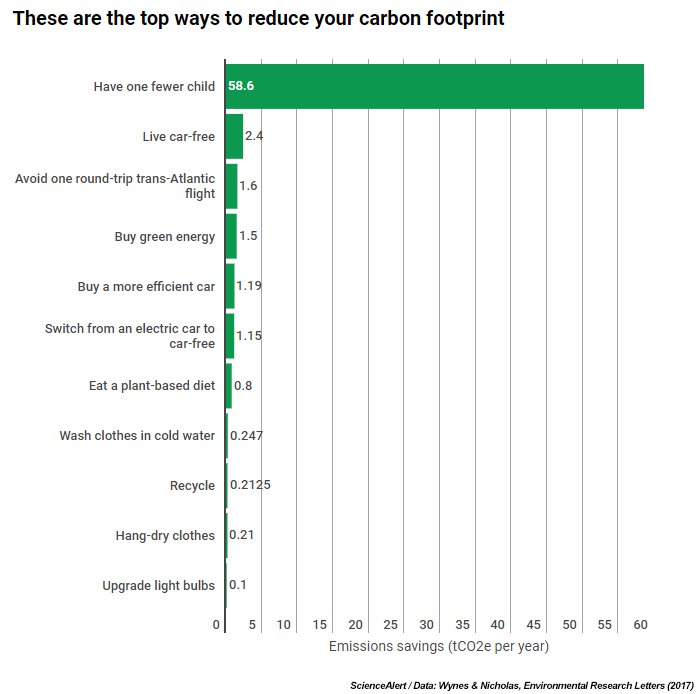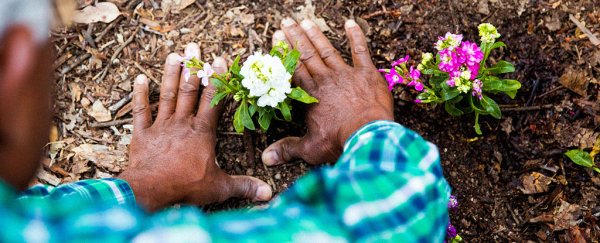It's easy to feel hopeless about the future of our world, especially when the latest IPCC report has just come out, warning that we have barely a decade left to prevent the most catastrophic climate change scenario.
Meanwhile, Earth's climate continues to smash record after record, plastic will outweigh fish in the oceans by 2050, and new species are already endangered before we even identify them.
It seems like no matter how many reusable shopping bags we take to the grocery store, our actions pale in comparison to the impact of big industries and decisions of global governments.
But scientifically speaking, that's not entirely the case. In 2016, a study found that, more than anything else, it's consumers who have the biggest impact on the planet.
While it's true that no single thing you do today will rival the vast levels of greenhouse gases being emitted by, say, the energy sector each year, the choices you make day in and day out really can add up to make a difference.
And yeah, we already know we should drive less, recycle our bottles, and wash our clothes in cold water. But that's just scratching the surface.
Here are some simple, science-backed things you can do to have a surprisingly big impact on the environment.
1. Stop using microbeads, right now
Those little beads in your favourite face scrub? Those are tiny fragments of plastic, and as soon as you wash them down the drain they end up all through our rivers and oceans. And we mean, all through them.
Studies have found microbeads in the stomachs of fish and other marine organisms. Even worse, these microbeads attract toxins, which allows damaging chemicals to concentrate up to the food chain and end up in the animals we eat.
Various countries are now banning microbeads, but do everyone a favour and cut them out of your life right now, if you haven't already.
2. Reconsider tampons and pads
On average, women use around 12,000 pads or tampons in their lifetime - which is the equivalent of around 300 pounds (136 kg) of waste, much of it made up of non-biodegradable materials such as polyethylene and other plastics.
With some 3.8 billion females on Earth, that number adds up quickly - it's estimated to be around 0.5 percent of women's landfill load during their fertile years. Of course, women need to use something during their periods, but there are other options.
Menstrual cups, reusable pads and period underwear lead to less environmental waste and also save women time and money. A 2011 study found that 91 percent of women who tried a menstrual cup would use one again and recommend them to others.
3. Have one less child (or none at all)
Controversial, we know. But the reality is, each new person we add to the planet contributes their own massive carbon footprint.
"We are a plague on Earth. It's coming home to roost over the next 50 years or so. It's not just climate change; it's sheer space, places to grow food for this enormous horde," David Attenborough told Radio Times back in 2013.
"Either we limit our population growth, or the natural world will do it for us, and the natural world is doing it for us right now."
A study from last year showed that simply having one less child is by far the biggest thing you can do to reduce your carbon footprint - cutting out a whopping 58.6 tonnes of CO2 emissions annually versus 2.4 tonnes of CO2 emissions saved by living without a car. It's something to think about.

4. Eat less meat, but also buy less food in general
Cutting back on meat in your diet can have a proven, positive impact on the environment.
But the problem with food doesn't end with meat - many 'healthy' alternatives carry their own impact. If we were to replace the calories people get from meat with vegetables, fruits, and legumes, it would still have a huge impact on the environment.
"If you stop eating beef, you can't replace a kilogram of it, which has 2,280 calories, with a kilogram of broccoli, at 340 calories. You have to replace it with 6.7 kilograms of broccoli," Tamar Haspel wrote back in 2014 for the Washington Post.
"Lots of common vegetables require more resources per calorie than you would think," said Paul Fishbeck, lead researcher of a 2015 study that showed certain vegetarian and 'healthy' diets can actually be worse for the environment.
The real problem isn't so much one particular type of food - it's that rich nations are still buying way more food than they actually eat. Right now, around one-third of all the food grown for consumption is thrown out.
So plan your meals each week, eat a simple, balanced diet, and don't buy more than you need.
5. Don't fall for the organic food trap
Speaking of food, there's a common misconception that organic is always better for the environment.
While reducing the amount of pesticides and fertilisers used to grow crops does have benefits, a meta-analysis in 2012 found that organic crop yields are on average 25 percent lower than conventional crops.
That means it takes about a quarter more land to produce the same amount of food - which has a big impact on the planet.
And while some of the practices used in the production of organic crops, such as crop rotation and mixed planting, are better for soil health, they're definitely not the only solution.
There's growing evidence that genetically modified plants might be another sustainable option. A 2014 analysis of 147 publications found that GM technology has reduced pesticide use by 37 percent and increased crop yield by 22 percent.
That's not to say organic crops should be avoided, but don't assume they're automatically the more sustainable option. On top of that, there's no conclusive evidence they're healthier for us, either.
6. Stop showering so much
The average American shower lasts 8.2 minutes and uses 17.2 gallons (65.1 litres) of precious freshwater. Not to mention the electricity or gas used to heat the water.
There's a lot of talk in environmental campaigns about reducing shower lengths, but we all know firsthand that, once you're in there, it's hard to hop out after 2 minutes.
Instead, maybe we should all just stop showering so often - in many parts of the world, people shower more than once a day.
While there are no official guidelines from health professionals on how often we should be bathing, frequent showering can strip our skin of natural moisturiser and we also run the risk of being too clean.
So if you smell okay, it might not be the worst thing in the world to skip your next shower. The environment will thank you.
7. Seriously, stop drinking bottled water
Okay, so you're probably already well aware of this - bottled water is notoriously bad for the environment.
But you might be surprised at just how bad it is - a study in the journal Environmental Research Letters found that roughly 32-54 million barrels of oil went into producing the amount of bottled water consumed in the US in 2007.
And the amount consumed is a lot. The average American drinks around 39 gallons (148 litres) of the stuff each year - more than soda, beer, or milk - and the rate is growing.
It also takes more water to make a bottle of water than it does to fill it - 1.39 litres (45 oz) of water are required to make a 1 litre bottle.
Unfortunately, there are places in the world where tap water isn't regularly tested for safety, and in these regions bottled water may be necessary.
But in many cities, tap water is perfectly healthy to drink and combined with a reusable filter jug, is no worse than bottled water.
To double check that your local tap water is clean, look up your region's Consumer Confidence Report. If you can't find it, contact your local representative.
8. Help scientists collect data
Citizen science projects aren't likely to save the world, but they can help underfunded scientists monitor the effects of climate change.
"I can't imagine in recent history where it has been more important for people to start taking matters into their own hands," Darlene Cavalier, founder of citizen science database SciStarter, told National Geographic in 2017.
Using your phone, you can document changes in cloud coverage via the NASA Observer Cloud App.
The Pieris Project gets citizen scientists to record information about the distribution of the cabbage white butterfly as the climate heats up.
You can even take selfies with your stream to collect data on water quality. Or make observations about the flora and fauna in your backyard with Nature's Notebook.
You can find more projects over at SciStarter.
9. Throw out your coffee pod machine (or just don't buy one)
We all love coffee, and making your own at home is generally a more sustainable option than grabbing a takeaway cup - despite what you might think, most of those paper cups aren't actually recyclable at all and, in Australia alone, an estimated 1 billion of them end up in landfill each year.
But if you're replacing takeaways with single-use coffee pods such as Nespresso, you're not doing the environment any favours.
There's a statistic floating around that if you collected all the single-use coffee pods sold by market leader Keurig in a year and lined them up end-to-end, you'd have enough to circle the globe 10.5 times over.
Even worse, those little cups are made from a mixture of plastic and aluminium, which means most recycling plants in the world don't have the facilities to recycle them properly.
In 2016, the German city of Hamburg became the first in the world to ban single-use coffee pods from all government-run buildings.
So do the planet a favour and cut them out, too.
10. Get really mad
Let's not forget that by coming together and agreeing on a global plan, the world managed to dramatically shrink the hole in the ozone layer last year to its smallest peak since 1988.
"It's extremely rewarding, because it was originally just a scientific effort, and then we were able to convince society that it was a problem - here's what would happen if we do not deal with it," said chemist Mario Molina, who won the Nobel Prize in 1995 for his research into the ozone hole.
Limiting global warming to 1.5 degrees Celsius is still scientifically possible, but we all have to act now, and act together.
So write to your government representatives, talk to your friends and family about environmental issues. When we work together, change really can happen, so don't let frustration silence you.
